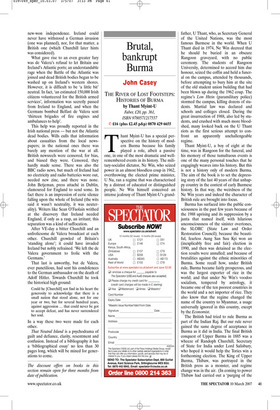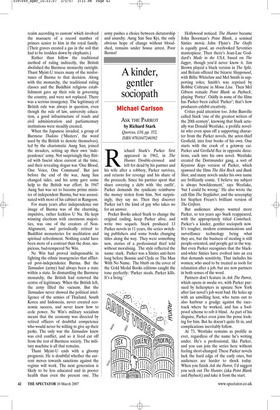Brutal, bankrupt Burma
John Casey
THE RIVER OF LOST FOOTSTEPS: HISTORIES OF BURMA by Thant Myint-U Faber, £20, pp. 361, ISBN 9780571217557 V £16 (plus £2.45 p&p) 0870 429 6655 Thant Myint-U has a special perspective on the history of modern Burma because his family played a role, albeit a passive one, in one of the most dramatic and wellremembered events in its history. The military-socialist dictator, Ne Win, who seized power in an almost bloodless coup in 1962, overthrowing the elected prime minister, U Nu, ran a regime that was characterised by a distrust of educated or distinguished people. Ne Win himself conceived an intense jealousy of Thant Myint-U’s grand father, U Thant, who, as Secretary General of the United Nations, was the most famous Burmese in the world. When U Thant died in 1974, Ne Win decreed that he should be buried in an obscure Rangoon graveyard, with no public ceremony. The students of Rangoon University, determined to accord him due honour, seized the coffin and held a funeral on the campus, attended by thousands, before attempting to bury him at the site of the old student union building that had been blown up during the 1962 coup. The regime’s Lon Htein (paramilitary police) stormed the campus, killing dozens of students. Martial law was declared and schools and colleges closed. During the great insurrection of 1988, also led by students, and crushed with much more bloodshed, many looked back on the U Thant riots as the first serious attempt to confront an apparently unchallengeable regime.
Thant Myint-U, a boy of eight at the time, was in Rangoon for the funeral, and his memory of those tumultuous events is one of the many personal touches that he engagingly weaves into his history. But this is not a history only of modern Burma. The aim of the book is to set the depressing story of the last 40 years of that unhappy country in the context of early Burmese history. In that way, the weirdness of the Ne Win years and indeed the character of British rule are brought into focus.
Burma has surfaced into the public consciousness in the past few years because of the 1988 uprising and its suppression by a junta that named itself, with hilarious unconsciousness of the sinister overtones, the SLORC (State Law and Order Restoration Council); because the beautiful, fearless Aung San Suu Kyi won an (inexplicably free and fair) election in 1990, and then was detained as the election results were annulled; and because of brutalities against the ethnic minorities of Burma. Some recall how, under British rule, Burma became fairly prosperous, and was the largest exporter of rice in the world; and that under Ne Win’s voodoo socialism, tempered by astrology, it became one of the ten poorest countries in the world and a net importer of rice. They also know that the regime changed the name of the country to Myanmar, a usage universally ignored in this country, except by the Economist.
The British had tried to rule Burma as part of the Indian Raj. But our rule never gained the same degree of acceptance in Burma as it did in India. The final British conquest of Upper Burma in 1885 was a wheeze of Randoph Churchill, Secretary of State for India under Lord Salisbury, who hoped it would help the Tories win a forthcoming election. The King of Upper Burma, Thibaw, was portrayed in the British press as a monster, and regime change was in the air. (In coming to power Thibaw had carried out a ‘purging of the realm according to custom’ which involved the massacre of a record number of princes senior to him in the royal family. (Their graves created a gas in the soil that had to be trodden down by elephants.) Rather than follow the traditional method of ruling indirectly, the British abolished the Burmese monarchy outright. Thant Myint-U traces many of the misfortunes of Burma to that decision. Along with the monarchy, the traditional ruling classes and the Buddhist religious establishment gave up their role in governing the country, and were not replaced. There was a serious insurgency. The legitimacy of British rule was always in question, even though the rule of law, university education, a good infrastructure of roads and civil administration and parliamentary institutions were steadily created.
When the Japanese invaded, a group of Burmese Thakins (‘Masters’, the word used by the British to denote themselves), led by the charismatic Aung San, joined the invaders, setting up their own ‘independence’ army. Not surprisingly they flirted with fascist ideas current at the time, and their revealing slogan was ‘One Blood, One Voice, One Command’. But just before the end of the war, Aung San changed sides, and his army gave some help to the British war effort. In 1947 Aung San was set to become prime minister of independent Burma, but was assassinated with most of his cabinet in Rangoon.
For many years after independence our image of Burma was of the charming, impulsive, rather feckless U Nu. He kept winning elections with enormous majorities, was one of the creators of NonAlignment, and periodically retired to Buddhist monasteries for meditation and spiritual refreshment. Nothing could have been more of a contrast than the dour, suspicious, bad-tempered Ne Win.
Ne Win had proved indispensable in fighting the ethnic insurgencies that afflicted post-independence Burma. But the Tatmadaw (army) had always been a state within a state. In dismantling the Burmese monarchy, the British had removed the centre of legitimacy. When the British left, the army filled the vacuum. But the Tatmadaw never showed the political intelligence of the armies of Thailand, South Korea and Indonesia, never created economic success, and never knew how to cede power. Ne Win’s military socialism meant that the economy was directed by retired officers of doubtful competence who would never be willing to give up their perks. The only war the Tatmadaw knew was civil conflict, and so it lived cut off from the rest of Burmese society. The military machine is all that remains.
Thant Myint-U ends with a gloomy prognosis. He is doubtful whether the current moves towards sanctions against the regime will work. The next generation is likely to be less educated and in poorer health than even the present one. The army pushes a choice between dictatorship and anarchy. Aung San Suu Kyi, the only obvious hope of change without bloodshed, remains under house arrest. Poor Burma!



























































































 Previous page
Previous page